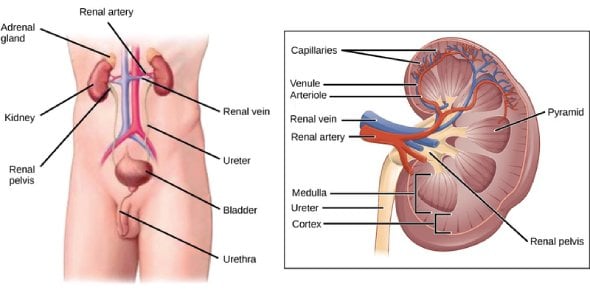The Excretory System
By Himanshu JoshiYogaThe Excretory System
It comprises the bowel, kidneys, skin and lungs. If any of these organs fail to discharge their normal functions, life can be endangered. In fact, all those organs serve as a sanitary system of the body, enabling it to rid itself of all the waste matter. A kidney each located on either side of lions (small of the back). Each kidney is supplied blood by a renal artery and renal vein – the former supplies the blood whereas the latter takes the blood away.
A ureter, attached to each kidney, helps the urine to be sorted in the blood. The bladder, too, is shaped like an inverted barrel and has sufficient capacity to store the urine, and when it is full an urgency to urinate arises, resulting in excretion of urine through genitals.
Urine is the yellow coloured fluid that carries the waste nitrogen, minerals, salts and proteins secreted into the kidneys. Kidneys are nature’s perfect filters that allow the escape of waste material (in the form of urine) only, when in health, and not allowing vital fluids to escape. In diseased conditions, all such vital fluids are drained out through urine, thus causing immense loss of vital fluids.
Read More :
Everything you need to know about Human Skeleton System
The bladder is an elastic or flexible membrane that serves as a reservoir, for the purpose of retaining and storing urine for a limited period only. The bladder receives urine in droplets from kidneys and is discharged up to in jets intermittently. A tight ring of muscle, known as a sphincter, does not allow the stored urine to escape voluntarily, except when the bladder contracts. When the bladder contracts, the sphincter relaxes, thus permitting effusion of urine.
Skin is another important organ that has three layers viz the top layer of skin (called epidermis or scarf skin), the second layer (called Dermis or true skin) and the third one consists of sebaceous glands which provide glow, shine and oily appearance to the skin. Skin acts as an excretory organ and discharges foul smell in the form of sweat, through the sweat glands.
It also helps to maintain proper temperature of the body, protect the body, impart a sense of touch and also covers the bony cage of the body. Just imagine how pugnacious and horrible our body looked, had it not been covered with skin. It’s sebaceous glands (a part of sweat glands), that secrete an oily substance to maintain tenderness, lubrication and glow of the body. The sweat glands contain small bits of skin, fats and salts.
Large and small intestines are termed as ‘bowels’ which through peristaltic action, help release faecal matter. Eyes, Ears, Nostrils and mouth also excrete waste and harmful excretions from the body.
But for the capacity of all the excretory organs, our body would have become a storehouse of toxins, inviting a host of many harmful disorders. Perhaps, it may be the reason why the Ayurveda impresses upon proper elimination of all the humour from the body and that their flow must not ever be impeded/restricted.
Normal secretion, from the excretory organs, provides and ensures an almost total immunity from diseases. Lungs also serve to throw out poisonous dioxide gas from the body to facilitate the entry of life-saving oxygen. Functions of lungs will be taken up under the ‘Respiratory System’.
Top Related Post






